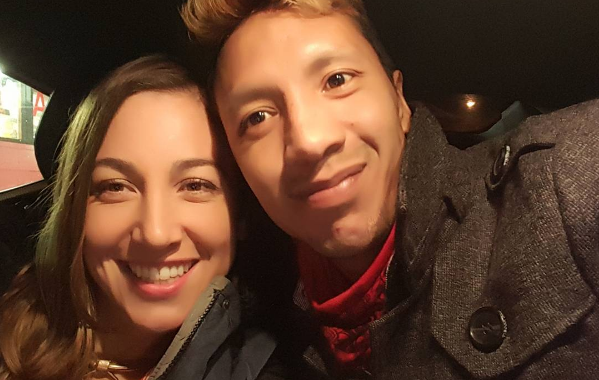Breatharian couple claim they live a 'food-free' lifestyle and haven't felt hungry since 2008
Several people have died attempting to follow a similar lifestyle, but experts suggest followers may be 'deluded' rather than deceitful

Your support helps us to tell the story
From reproductive rights to climate change to Big Tech, The Independent is on the ground when the story is developing. Whether it's investigating the financials of Elon Musk's pro-Trump PAC or producing our latest documentary, 'The A Word', which shines a light on the American women fighting for reproductive rights, we know how important it is to parse out the facts from the messaging.
At such a critical moment in US history, we need reporters on the ground. Your donation allows us to keep sending journalists to speak to both sides of the story.
The Independent is trusted by Americans across the entire political spectrum. And unlike many other quality news outlets, we choose not to lock Americans out of our reporting and analysis with paywalls. We believe quality journalism should be available to everyone, paid for by those who can afford it.
Your support makes all the difference.Studies have shown the health benefits of brief periods of fasting, but one couple is making the bizarre claim that they have learned to survive largely without food and are instead sustained by “cosmic nourishment”.
Camila Castello, 34, and Akahi Ricardo, 36, are what is known as “Breatharians”. They say they eat just three times a week, with each ‘meal’ consisting of just a piece of fruit or some vegetable broth.
Such claims have attracted equal measures of ridicule and alarm in the past.
Breatharianism has been linked to the deaths of several people, including Verity Linn, a 49-year-old Australian whose emaciated body was found on a mountain in north-west Scotland in 1999, alongside a diary recounting her 21-day fast and a copy of a book by the founder of Breatharianism, known as Jasmuheen.
Born in Australia as Ellen Greve, Jasmuheen has herself warned of the dangers of life with no or very food.
“If a person is unprepared and not listening to their inner voice there can be many problems with the 21-day process, from extreme weight loss to even loss of their life,” she wrote in one of her books.
Jasmuheen took part in a monitored fast for Australia’s 60 Minutes news programme in an attempt to prove her claims, but the show’s doctors cut short her attempt to last seven days after she became dehydrated, lost weight and her speech began to slow.
Nevertheless, Castello and Ricardo, who live between California and Ecuador, say they have forgotten what it feels like to be hungry.
They claim they survive on the “energy that exists in the universe and in themselves”.
“Humans can easily be without food, as long as they are the connected to the energy that exists in all things and through breathing,” Castello says.
“For three years, Akahi and I didn’t eat anything at all and now we only eat occasionally like if we’re in a social situation or if I simply want to taste a fruit.
“With my first child, I practised a Breatharian pregnancy. Hunger was a foreign sensation to me so I fully lived on light and ate nothing.
“My blood tests during all three trimesters were impeccable and I gave birth to a healthy, baby boy.”
Dee Dawson, an expert on eating disorders, once gave an insightful explanation as to why some people seem to honestly believe they are do not need food.
“Breatharianism is a fraud, but breatharians may be deluded,” she told the Guardian.
She suggested believers tend to overlook some of the food they eat in a similar way to people who are struggling with their weight.
"Every obese person who comes into my surgery says, 'Doctor, I can't understand why I'm not losing weight — I haven't eaten all week,” Dawson said.
“Then I say 'What did you have for breakfast?' 'Oh, just three pieces of toast.' 'And lunch?' 'Just one sausage and few chips...' Add it all up and they've eaten 2,000 calories that day.”
While Castello says she “ate nothing” during her pregnancy, this is meant as a figure of speech meaning “almost nothing” as she also says she “only ate five times, all of which were in social situations”.
The couple have a five-year-old son and a two-year-old daughter, but they don’t impose their Breatharian lifestyle on the children.
“Our children are aware of Breatharianism and the energy that exists in the universe and in themselves,” Ricardo says.
“But we would never try to change them and we let them eat whatever they want – whether that be juices, vegetables, pizza or ice-cream!
“We want them to explore the different tastes and have a healthy relationship with food as they grow. It would be unfair to impose Breatharianism upon our children now but maybe as they grow, they will get deeper into the practices.”
The couple met in 2005 and first discovered Breatharianism in 2008. They eventually transitioned from vegetarians, to raw vegans, to fruitarians and finally to Breatharians.
“There is a freedom that comes with not being attached or dependent on food,” Ricardo says.
“Obviously, our living costs are a lot less than most families and that has allowed us to spend our money on things that really matter like travelling and exploring together.
“It’s given us a clear sense of what we want in life ... It’s not about never eating food again, it’s about understanding cosmic nourishment (not just physical nourishment) and living without limits."
According to the NHS, “eating a healthy, balanced diet is an important part of maintaining good health".
They recommend a balance of fruit, vegetables, starchy foods, dairy or dairy alternatives, protein, unsaturated fats and plenty of fluids.
Independent staff contributed to this updated report